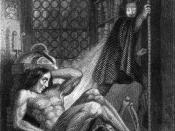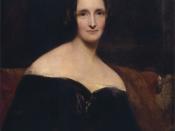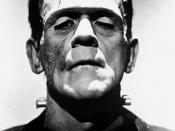Mary Shelley's Frankenstein: Criticized Heroism
Heroes are typically the world's saviors. Everyone wants to be one, although most of the true heroes in society are not recognized as they should be. Heroes are by definition those that are much admired or display true courage. For example, Hercules is the man of strength while Spiderman is here to protect his fellow man, but what about Mary Shelley's Victor Frankenstein? All these heroes, created in the minds of humans, have not received the same admiration for their heroic deeds. In the novel Frankenstein, Victor tests his scientific capabilities and succeeds but does not receive the recognition he deserves.
Victor Frankenstein heroically challenges the scientific norm but simply receives ridicule from professors and fellow associates. He determines "to learn the hidden laws of nature" (22) and displays his curiosity of creation. Victor's need to discover the entire universe can not be hidden any longer.
The danger of knowledge and capability to corrupt society is evident to everyone but not to Victor; he is determined. Victor turns away from his life and all of his surroundings to create a masterpiece of his human imagination. In the dissecting room and slaughterhouse he eagerly brings his "work ... to a conclusion" (39). Victor has become obsessive with his task primarily because of others abhorrence to his work. Consequently, Victor is able to finish without much interference but does not receive much recognition. Even when the project is complete his work, which would "usually deemed marvelous" (14), was not accepted by others. He is looked upon as an abnormality and a nuisance, although, he is a hero in his own mind and in scientific development by creating this monster. Despite criticisms of his fellow scientists, he is indeed ahead of his time.
Due to...


